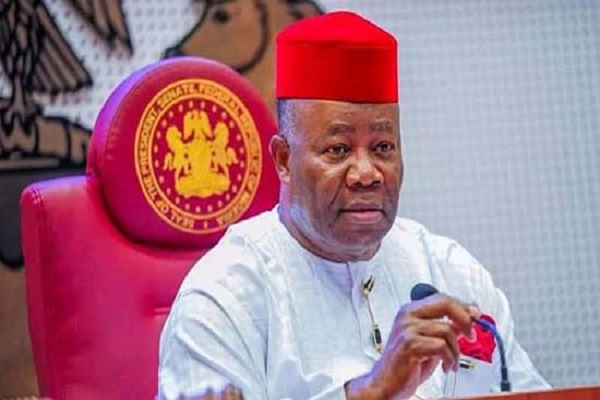Akpabio Challenges Obi’s Leadership Capacity Amidst Labour Party Turmoil
The Nigerian political landscape witnessed a heated exchange as Senate President Godswill Akpabio publicly questioned the leadership credentials of former Labour Party presidential candidate, Peter Obi. The catalyst for this confrontation was a valedictory session held in honor of the late Niger Delta statesman, Chief Edwin Clark. During the session, Akpabio seized the opportunity to criticize Obi, suggesting that his focus on national issues was premature given the internal strife within his own political party. Akpabio pointedly questioned Obi’s ability to address complex national challenges like the Boko Haram insurgency when he had yet to effectively resolve the leadership crisis plaguing the Labour Party. He further admonished aspiring presidential candidates against using social media platforms to sow discord, urging them to prioritize internal party cohesion before vying for national leadership.
Akpabio’s critique extended beyond Obi’s party management skills to encompass a comparison of their respective governance records. He highlighted his own accomplishments as governor, citing infrastructure development projects, investments in healthcare and education, and initiatives promoting religious harmony. He underscored his commitment to public service by referencing the construction of dual carriageways, the establishment of international hospitals, the implementation of free and compulsory education policies, and the sponsorship of religious pilgrimages to Jerusalem and Mecca. Akpabio juxtaposed these achievements with Obi’s perceived lack of comparable accomplishments, implying that aspiring national leaders should demonstrate their capacity for effective governance at lower levels before seeking higher office.
The genesis of this public spat can be traced back to Obi’s remarks during his tribute to Chief Edwin Clark. Obi had lamented the perceived futility of the sacrifices made by Nigeria’s past heroes, citing the deteriorating economic and social conditions prevailing in the country. He specifically referenced the public outcry against fuel price hikes during the Jonathan administration, contrasting it with the apparent apathy towards the current significantly higher fuel prices. This observation, interpreted as a critique of the current administration, appears to have provoked Akpabio’s response.
Adding another layer to this political drama, Edo State Governor Godwin Obaseki also entered the fray, criticizing Obi for questioning the credibility of the September 21, 2024 governorship election in Edo State. Obaseki, through his Chief Press Secretary Fred Itua, vehemently defended the integrity of the election, describing Obi’s remarks as unfounded, disrespectful, and politically motivated. He emphasized the high standards of transparency and fairness adhered to during the electoral process and urged Obi to respect the mandate given by the Edo people. Obaseki further cautioned against reckless and divisive rhetoric that could jeopardize the peace and stability of Edo State.
This exchange between prominent political figures illuminates the ongoing power dynamics and ideological clashes within the Nigerian political arena. Akpabio’s challenge to Obi’s leadership, rooted in the Labour Party’s internal struggles, underscores the importance of party unity and stability in the pursuit of national leadership. The contrasting narratives presented by Akpabio and Obi regarding their respective governance records highlight the ongoing debate on effective leadership and service delivery. Furthermore, Obaseki’s condemnation of Obi’s election-related comments emphasizes the sensitivity surrounding electoral integrity and the need for responsible political discourse.
These intertwined controversies offer a glimpse into the complex interplay of personalities, policies, and political ambitions that shape Nigeria’s political landscape. The public nature of these exchanges reflects the growing importance of public perception and media narratives in shaping political discourse. As Nigeria navigates its political future, these events serve as a reminder of the challenges and opportunities inherent in the pursuit of effective governance and national unity. The sparring between these political heavyweights underscores the high stakes involved in the competition for political power and the ongoing quest for national development. The differing perspectives on leadership, governance, and electoral integrity highlight the complexities of navigating the Nigerian political landscape and underscore the need for constructive dialogue and collaborative efforts to address the nation’s multifaceted challenges.














